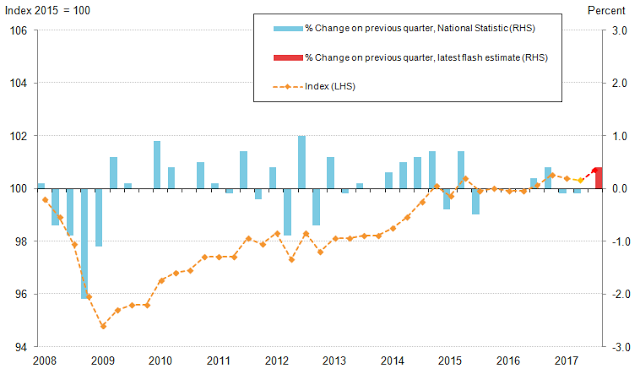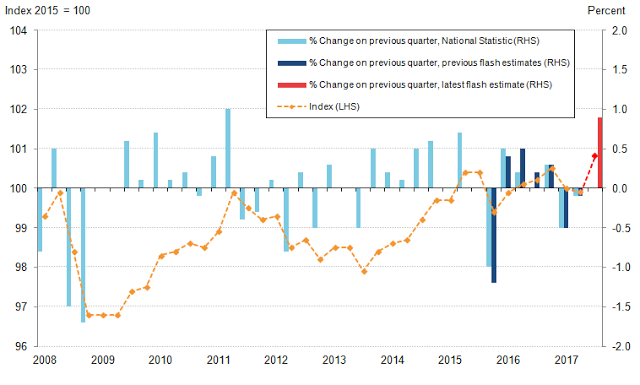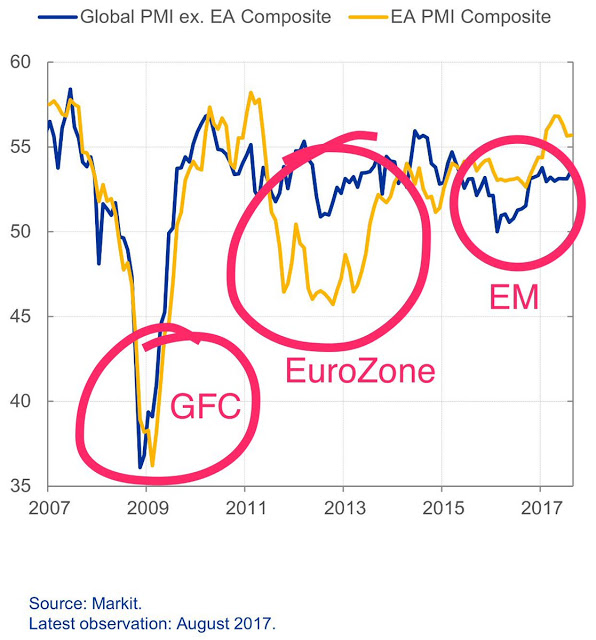The ONS's latest flash productivity estimate is rather good. Productivity in Quarter 3 2017 was up by 0.9% on the previous quarter. Here's what ONS has to say about it: Output per hour growth in Quarter 3 2017 was the result of a 0.4% increase in gross value added (GVA) (using the preliminary gross domestic product (GDP) estimate) accompanied by a 0.5% fall in total hours worked (using the latest Labour Force Survey data). This fall in total hours was driven primarily by a 0.5% fall in average hours per worker. Yes, yes, I know - economics jargon. Let me translate. ONS in plain English: People are working fewer hours, but they are producing more every hour. Of course, this should be set against the backdrop of persistently low productivity since the 2008 financial crisis. Productivity
Topics:
Frances Coppola considers the following as important: Brexit, GDP, labour, production, productivity, trade
This could be interesting, too:
Angry Bear writes GDP Grows 2.3 Percent
Merijn T. Knibbe writes The political economy of estimating productivity.
Merijn T. Knibbe writes In Greece, gross fixed investment still is at a pre-industrial level.
Merijn T. Knibbe writes ´Fryslan boppe´. An in-depth inspirational analysis of work rewarded with the 2024 Riksbank prize in economic sciences.
Output per hour growth in Quarter 3 2017 was the result of a 0.4% increase in gross value added (GVA) (using the preliminary gross domestic product (GDP) estimate) accompanied by a 0.5% fall in total hours worked (using the latest Labour Force Survey data). This fall in total hours was driven primarily by a 0.5% fall in average hours per worker.Yes, yes, I know - economics jargon. Let me translate. ONS in plain English:
People are working fewer hours, but they are producing more every hour.Of course, this should be set against the backdrop of persistently low productivity since the 2008 financial crisis. Productivity has taken nearly a decade to return to its pre-crisis level: The ONS says that productivity has been weak because the labour market has been relatively strong during this time:
Both employment – which captures the total number of people in work – and total hours – which captures both changes in employment and working patterns – fell in the course of the economic downturn, but total hours fell further reflecting falls in the average hours of those in employment. However, as GDP fell by a larger proportion in the economic downturn than either hours or employment and has grown slowly by historical standards during the recovery, productivity growth has been subdued since the downturn and has recovered more slowly than following previous downturns.Yes, yes, I know.....here it is in plain English:
People carried on working during the downturn, but they didn't produce as much.We can speculate why this might be. Both international trade and domestic demand suffered a severe contraction after the crisis, which would have reduced output, but if businesses were expecting the downturn to be short-term they might simply have reduced people's working hours rather than laying them off. Also, disrupted supply chains might have made it difficult for workers to maintain output levels: managing those disrupted supply chains would have created additional work for admin & management without adding anything to GVA. There was also something of a boom in regulation, especially in financial services, which does absolutely nothing to increase output but employs lots of people.
This chart gives further weight to the argument that trade contraction and disrupted supply chains are a principal driver of the UK's productivity slump:
The "three shocks" of which I have previously written are very obvious here: the deep economic recession of 2009, followed by the Eurozone crisis, and then the emerging-market shock. For comparison, here is Peter Praet's chart of the three shocks, annotated by Toby Nangle:So for the UK's open economy, there is an obvious positive correlation between global PMI and productivity. Well I never. When global businesses get hit by financial shocks, they cut production. Who knew?
And this brings me to a serious warning. It is clear from the chart above that the UK's small open economy is crucially dependent on external trade. Don't be fooled by the trade balance, or the small proportion of businesses that export directly: many domestic businesses support exporters while not exporting themselves, and many domestic businesses are importers. When external trade suffers a shock, GDP and productivity growth both fall, sometimes significantly. And Brexit - any variety of it - will be a major shock to external trade.
Brexiteers' upbeat forecasts for the UK are founded on the idea that external trade will be resilient to the UK leaving the EU. Some even say it will improve. They will no doubt crow about the fact that the UK's productivity is currently rising and dub gloomy forecasts as "Project Fear".
But there are already indications that EU trade partners are diverting supply chains away from the UK. And IHS Markit reports that business optimism in the UK is the lowest it has been since 2011. Disrupted supply chains are a serious drag on both output and productivity. I fear that the Brexiteers' optimism may prove to be "Project Fantasy".
Related reading:
Lehman's Aftershocks
We need to talk about productivity



